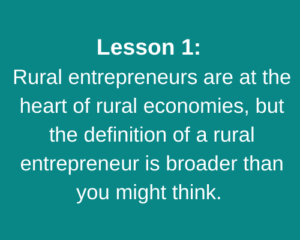Lessons Learned from Ecosystem Building in Oregon: Lesson 1

“People feel social capital when they are able to go to a local business, be at a coffee shop, or a hardware store, or the hair salon, and feel more attached to and embedded in their communities. That’s a quality of life thing. To me, that’s one of the very most important ways that entrepreneurship strengthens rural communities.”
– Chris Watson, Executive Director, Warm Springs Community Action Team
Entrepreneurship is deeply connected to quality of life in rural communities. A healthy network of local businesses intertwines social and economic well-being, and creates connection and a sense of community. These local businesses are not only the foundation of economic prosperity, but help rural communities create and preserve their identity. Rural entrepreneurs are the heartbeat of their community, driving it forward, and establishing the culture and tone, especially for visitors.
The definition of “entrepreneur” in rural communities is broad, and does not just include new businesses aiming to scale in a narrow set of sectors such as manufacturing and technology. Instead, it includes anyone along a spectrum from thinking about starting a business to long-time owners of businesses, and from businesses that serve the local community (the local corner store) to those with a much wider market (a craft brewery). And even though all of these people may not see themselves as entrepreneurs, their ability to create, adapt, pivot, and/or grow their businesses is vital to community well-being.
While there are large businesses in rural communities that need attention and support, the vast majority – and particularly those who need basic assistance – are small businesses.2 We see a need to focus in on this group especially, and call them “small business entrepreneurs.” These entrepreneurs often wear multiple hats in a rural community, as business owners, community leaders, often organizing a living from multiple activities and part-time efforts. The connections they build through these various roles builds networks and contributes to overall economic resiliency. The money that small business entrepreneurs make is particularly “sticky,” in that it stays and circulates within the community.
“As somebody learns entrepreneurship, they become empowered – they become empowered to pilot their own plane in their approach of how they want to change their life and community.”
– Jacob Perritt-Cravey, Owner, Tree Ring Consulting
2 The definition of “small business” varies, but we have found that most rural businesses employ less than 25 people, and the majority are between 1 and 5 people.
